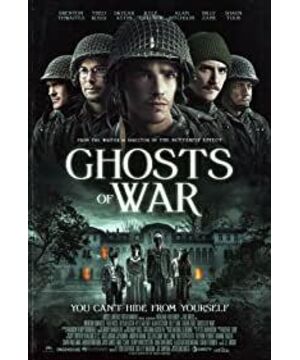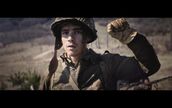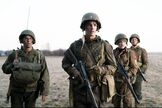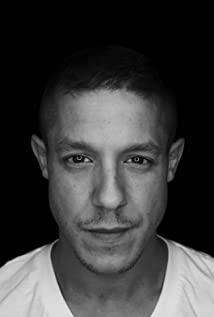| The text contains spoilers, friends who haven't watched the video should not pull down
|
|
|
|
Down
Arts
drama
through
police
tell
|
|
|
The movie is classified in ghost movies, and the score is close to 7 points, which is not bad. The first few short comments are honest, very tacit and no spoilers.
There are very few places to be scared after watching it. As a ghost movie, there are no new breakthroughs. The special effects and atmosphere creation can only be regarded as ordinary. But I am not disappointed to see such a film. Although it is not wonderful, it has a few touches that I want to write.
The script is very bold, or rather sloppy. A ghost story is told in more than 90% of the space. There are only ten minutes left and the film is about to end, suddenly destroying the logic established by the whole ghost story, telling the reason for the haunting, and leading to the second story: real life. The real life stopped abruptly after five minutes, and the protagonist continued to go back to the ghost story to suffer. The film ends here, without giving any clues as to whether the soldiers are dead or alive, leaving only one question: how will the survivors survive after the massacre?
I asked the same.
At the beginning of the night camp, the five people sleep in a strange arrangement, and the strange thing is that no one is watching. One woke up and saw the silhouette of the jungle. His teammates were still in a drowsiness. According to the routine of horror movies, he did not shout to warn his companions or shoot, and smelled the horror in the night sky alone. After the mysterious man took a breath, the soldier asked: what do u want ? This question made the atmosphere uncertain again, and I was more familiar with communicating with ghosts, such as "Who are you?", "What do you want to do to me?" ", "Don't come here", "Don't pester me if I have a debt and a master" and so on. When he asked what the ghost wanted, his tone was less fearful and more meant to explore and dig secrets.
The screen instantly cuts to daylight. A few lines of dialogue explain that the story took place in World War II. A five-man squad of Allied troops on a mission in France. After walking a few steps, the captain made a violent stop gesture, organized an ambush, and blew up a German truck with a mine.
Some of the wounded were executed, some were tortured to death (the picture was uncomfortable), and some team members insulted the corpse, but the captain did not interfere. After shooting the last prisoner, the team had just walked a few steps before they noticed movement ahead. Anxiously ambushed for thirty seconds, a large group of fleeing civilians appeared. The team member who insulted the corpse ran to a mother holding a child, put down the gun a few meters away, gestured carefully, approached, and put the German coat on the woman he just got. He took out the packet again, and opened seven or eight gold teeth—all of which seemed to have been pulled from the mouths of German dead—all given to the woman.
These two episodes are not the usual behavior of warriors in ordinary war movies. When killing German wounded and prisoners, the camera deliberately reflects the cold-blooded cruelty of the soldiers, almost perverted. When a civilian was discovered later, the same person immediately put down his guard, and his expressions and actions became sad and gentle. And in front of the mother and daughter who fled, she eagerly took care of each other and showed her concern plainly.
The foreshadowing starts here. The film sets the above details in conflict with the sense of reality, suggesting that such a major change in behavior is unlikely to happen in real life. Combined with the ending, it also confirms that this almost instantaneous drastic change is not actual behavior, but emotions and feelings. The thoughts of the soldiers are intertwined with a variety of complex emotions. One second, the hatred for the slaughtering German army is deep into the bones, and the next second, he thinks of innocent people, and then pours out his compassion and rescue.
Saying goodbye to the civilians, the team found the campsite, a luxury villa. There was another obvious foreshadowing, and the other team waiting for the defense switch looked flustered and was eager to leave the villa. I asked several times, but got no answer. The ghost movie has officially started.
Ghosts come out every night to terrorize the Allied squads, the sculptures teleport, and there are always strange sounds on the floor. There was a battle in the middle, and the ghosts assisted the Allied team. Not only ghosts could kill invisible people, but people could also easily KO ten times the German army. So the film shifted from a ghost movie to a surreal ghost movie, and I began to wonder what kind of story the movie was going to tell. Because ghosts are only afraid when they intervene in real life. How do a group of ghosts in a non-real environment get in touch with real people? Why do real people appear in non-real environments?
After the battle, the ghost movie atmosphere returned, repeating the scary moves of the previous night. At this time, the telegraph operator turned over the German diary and finished the tragedy of the villa owner being wiped out by the German army. I also almost thought the story was over, the ghosts had their revenge, and the team could get away by helping the ghosts to rest in peace.
Unexpectedly, the first reversal appeared at the end. After burying the seriously injured and dead teammates, the remaining four could not get out of the strange place for a few days. I had to go back to the villa, find the remains of the owner of the villa, and hold a funeral. The buried ghost did not appreciate it, but instead increased its power and further attacked the team of four.
During the scuffle, the captain wakes up and finds himself lying in a twenty-first century hospital (reversal two). Seeing the remains of himself and his comrades, he vomited for a while, then calmed down and recalled the past. Turns out WWII and the haunted villa were in their dreams. The five-person team lives in the 21st century, was injured in the war in Afghanistan, and was sent to the hospital for assisted treatment with dreams.
What's happening in Afghanistan is scarier than a haunted house. The civilians who assisted the U.S. military were killed, and the five-member team hid in the house and did not dare to rescue due to the disparity in strength. Witnessed children being hanged and fathers being burned. Later, the surviving mother detonated the explosives, and the bodies of the soldiers were severely damaged in the explosion. And their hearts, because they saw death, had been devastated before the explosion.
The hospital created World War II Dreamland, hoping to heal emotional wounds by evoking the soldiers' will to survive through the experience of being far away from real life. However, in those who survived the massacre, there is a great power of despair in the emotions. This desperation creeps into the dream, changing the content of the dream healing system settings, leaving them stuck in a dead end to repeat.
The protagonist said that there are ghosts in the dream system, which is the curse of suicide attackers. This sentence may not be true. The captain recalled that after the explosion, the team members lay in a coma in a pool of stumps and blood, but the mother, who was holding the bomb exploded, was not injured and could shout a curse loudly. This impossible picture shows that the captain has a memory problem and fabricates something that never happened. The captain's sanity in the hospital was also not clear, and he could no longer identify false memories.
In addition, the captain recalls that the picture of his mother going crazy before the explosion may also be a hallucination. He felt deeply guilty for the murder of the Afghan civilian family, and believed that the other party had the right to resent him, and he should be severely punished. After being seriously injured by the bomb, his traumatized brain functioned disorganized, and he was swayed by a powerful guilt, concocting a picture of his mother bombing him and uttering a curse, explaining the cause of the injury. These fabricated pictures can prove that the serious injury is the punishment he deserves, making him think that he has paid for part of the guilt at the cost of having half of his body disabled. So he believed the hallucinations.
In fact, the dying actions of the slain Afghan family showed no hatred for the U.S. military. Even if the parents did not dare to expose the U.S. military hiding in the home before, fearing that the whole family would be sure that the traitor would die, and had to protect the U.S. military, it was possible to protect their children, but watching their children be killed without betraying the soldiers means that the parents did not blame the death of their children on the them.
Moreover, when the parents saw the two newly-reinforced vehicles, they knew that the number of terrorists had an absolute advantage, and that the US military raid could not save the family, only six more people were killed. They no longer hold out hope that the U.S. military will come to the rescue. The family did not betray the six, even though they were useless to themselves. So the family is unlikely to hold grudges against the U.S. military.
In reality, if a mother really wants to take revenge on the U.S. military, she is more likely to take revenge as soon as her children and husbands are killed. The room is small and there is nowhere to hide. As long as you expose the location of the US military to terrorists and shoot a salvo towards the hiding place behind the curtain, you can kill six people in one fell swoop. She would not wait for the IS members to leave, and the fighters went to the open area outside the house to disperse before they ignited hatred and detonated suicide bombs.
Others can analyze it rationally and know that the victim will hate the murderer even more than the person who has not been rescued, not to mention that the person who has not been rescued is still in a desperate situation that cannot be rescued. But any survivor with a conscience who sees the tragic death of an innocent person but dares not reach out to help, will feel a strong sense of guilt. This "he died and I live" guilt interferes with judgment and imagines the hallucination of resentment.
Unfortunately, unless you hear the victim say I don't blame you, the survivor, driven by guilt, can't get rid of the victim's imagination of resentment. Fear arises from imagined resentment. Combined with grief and anger, it ravages the souls of survivors. What is even more regrettable is that it has happened countless times. In reality, the victims have been silent forever, and you cannot personally comfort the survivors. You are not wrong, explaining that he only hates murderers.
So the ghost in the dream actually comes from the guilt, anger, sadness and fear of the warrior. They think over and over again, since when did things go wrong?
Young people are patriotic, join the army, and accept tasks to participate in the war. Is the idea of becoming a soldier and defending the motherland wrong?
When civilians from a foreign country were arrested for assisting the army, the superiors ordered them to fail to save them. Is it wrong for the soldiers to obey their superiors?
Children are about to be killed, and they are holding their superiors hostage to save lives. At this time, the enemy reinforcements have no chance of winning. The attack will not save the children, and the five fighters will be wiped out. Is it wrong to keep hiding?
The surviving mother watched her family get killed, collapsed, went mad, and detonated a suicide bomb. Was she at fault? Is there anything wrong with a mother who is so sad that she kills like crazy?
One soldier, who blocked the bomb with his body, was the worst injured. He lost his will to survive after sobering up in the hospital and was the first to die. Was his brave sacrifice wrong?
The captain and three other comrades in arms suffered emotional torture such as guilt, sadness, anger, etc. during the dream treatment. Is it wrong that they are powerless in the tragic killing of civilians?
Maybe the film wants to answer that it was the fault of the war, the US that started the war was wrong, and the invasion of Afghanistan was wrong. I agree with this answer. Because in the film, the Afghan children and their fathers, their mad and self-destructing mothers, and the five-person team are all innocent. They have committed no fault themselves, but they have been brutally killed. From my outsider's shallow understanding, there is no doubt that IS members are the direct murderers; and the US government, which sent US troops to the war, must also take responsibility for the deaths and injuries of civilians and soldiers in the war. And I believe that the American people and the Afghan people will seriously reflect on the other deep reasons behind this disaster and seek the truth and answers.
The five-man squad is a group of victims. They experienced a dehumanizing massacre in Afghanistan. As a survivor, the guilt of not being able to save people, the guilt of surviving, the grief and fear of seeing innocent people being slaughtered, the anger towards the murderer, the anger towards oneself, and the despair towards reality, is a knife that pierces the soul, Leaving bloody wounds.
Trauma maps to dreams, each with its own correspondence. The homeowner's family covered the Jewish extermination. Transforming into a ghost and attacking the five-person team is driven by the guilt of the five. Soldiers believe that they have a responsibility to protect civilians, and even if rescue can not change the outcome of death, they still take responsibility for civilian deaths. So they understand that civilians resent that they are desperate, being harassed and attacked by ghosts, and subconsciously wanting to punish themselves and repay their unfulfilled responsibilities.
Ghosts harass attacks, scaring squad members. Corresponding to the deep guilt in reality, the soldiers believed that the victims had reason to resent revenge. They were terrified of it. This instinctive fear and desire to survive drives them to fight against the ghosts who represent guilt and desire to die.
Germans correspond to IS killing Afghan civilians. Killing fifty German soldiers is a psychological projection of the team members who want to correct reality. They want to repel the murderer and save the civilians, and they also need to vent their anger towards the murderer, so there will be a miracle of fighting ten battles in their dreams.
The ghosts take part in the battle and assist in killing the Germans, corresponding to the two views of the warriors. It was the Germans who made the tragedy first, and they deserved to be punished. The second hope is that the victims can forgive the helplessness of the soldiers and stand on the same side of the soldiers to deal with the common enemy.
To change the unchangeable history, the soldiers were traumatized by this idea. They will repeat the tragedy over and over again, relive the damage they have suffered, until they give up their lives.
Unless the warrior can find another way out: change the present and prevent the future from happening again.
At the beginning, the soldier asks the ghost of the burned father
What do you want ?
what do you want?
What does the victim want?
What do survivors want?
Let the murderer be punished, and the truth will be revealed to the world.
Let the anger subside and the guilt gradually subside.
Let sacrifices not be forgotten, warriors wash away stigma,
Let the surviving be comforted, and the weak cry can be heard by the world.
Let the victims stop resenting each other, and the survivors will not become sacrifices.
Let everyone, if they wish, discuss the reasons for this massacre.
Let everyone be vigilant and learn from the tragedy to avoid repeating the same mistakes.
At the end of the film, the captain wanted to save his teammates and voluntarily returned to the dead end. His memory faded and he asked the same question:
What do you want ?
I want, after the slaughter, that every soldier will not give up hope to heal the wounds, not give up hope to escape the dead end, and finally find another way
View more about Ghosts of War reviews











